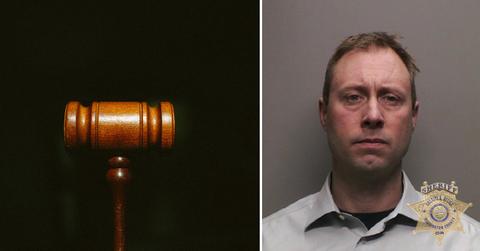Lawyer who drunkenly shot up an office will be able to practice law again. Here's why.

A lawyer who drunkenly shot up an office of a fellow attorney will have the chance to practice law again — though it will be years before he can see clients.
Erik Graeff was an attorney in Oregon. He was also an Iraq war veteran who suffers from Post-Traumatic Stress Disorder.
Last week, the Oregon Supreme Court ruled that his law license should be suspended for five years for criminal and unethical actions. The move stops short of disbarring him and preventing him from practicing law, but is the maximum suspension allowed.
In December 2017, Graeff got into a disagreement with another lawyer. The two exchanged threatening emails and Graeff threatened to show up at the office, according to court records. Graeff admitted he was drinking alcohol most of the day, and he had an alcohol dependency issue.
Later that day, Graeff drove to the office and fired six shots. The law firm manager was in the building and one bullet missed hitting her in the head by inches, according to court records. The employee was not physically hurt in the incident.
“But for the seven inches by which the bullet missed her, the office manager would have been physically, as well as emotionally injured,” the court noted.
Graeff fled the scene and drove home. He was charged with various crimes and served ten months in prison.
There were also accusations that, as a lawyer, Graeff did not communicate with his clients.
The Oregon Supreme Court reviewed both the ethical and criminal allegations against Graeff to decide how he should be punished. The failure to communicate with the clients happened over a short time, but was a crucial phase of the proceedings, the court found.
- Georgia Attorney Thought A Neighbor Dented His Mercedes. Then In A Rage, He Fatally Ran Him Over.
- A Man Was Mad He Was Fired From His Cemetery Job Years Earlier. So He Decided To Kill The General Manager.
- An Illinois man ran over his customer after a botched drug sale. Here's how long he'll spend in prison.
As for the criminal actions, the Supreme Court found the shooting caused both actual and potential injuries. However, Graeff's insurance company did pay for the property damage.
Oregon highest court found there were several aggravating factors that led to the crime.
“An aggravating factor in this case is that [Graeff] still does not acknowledge the wrongful nature of his conduct in failing to communicate with his clients, and, more importantly, although [Graeff] acknowledges that his criminal conduct was wrongful, he minimizes it.”
Graeff asked the court he only be suspended for one year and did not express remorse for his actions.
The court noted that there were several mitigating factors, such as Graeff did not have a criminal history and suffered from emotional problems.
While the alcohol issues fueled the misconduct, the court also stated there were hours between the disagreement between the lawyers and when Graeff shot the office. The dependency did not impede his ability to plan and carry out the attack.
The court said if it wasn’t for the mitigating factors, it might have disbarred Graeff. But, with them in place, the court found the maximum, five-year suspension was the appropriate punishment. The judges also said there is no similar case they could turn to for guidance.
Become a Front Page Detective
Sign up to receive breaking
Front Page Detectives
news and exclusive investigations.
